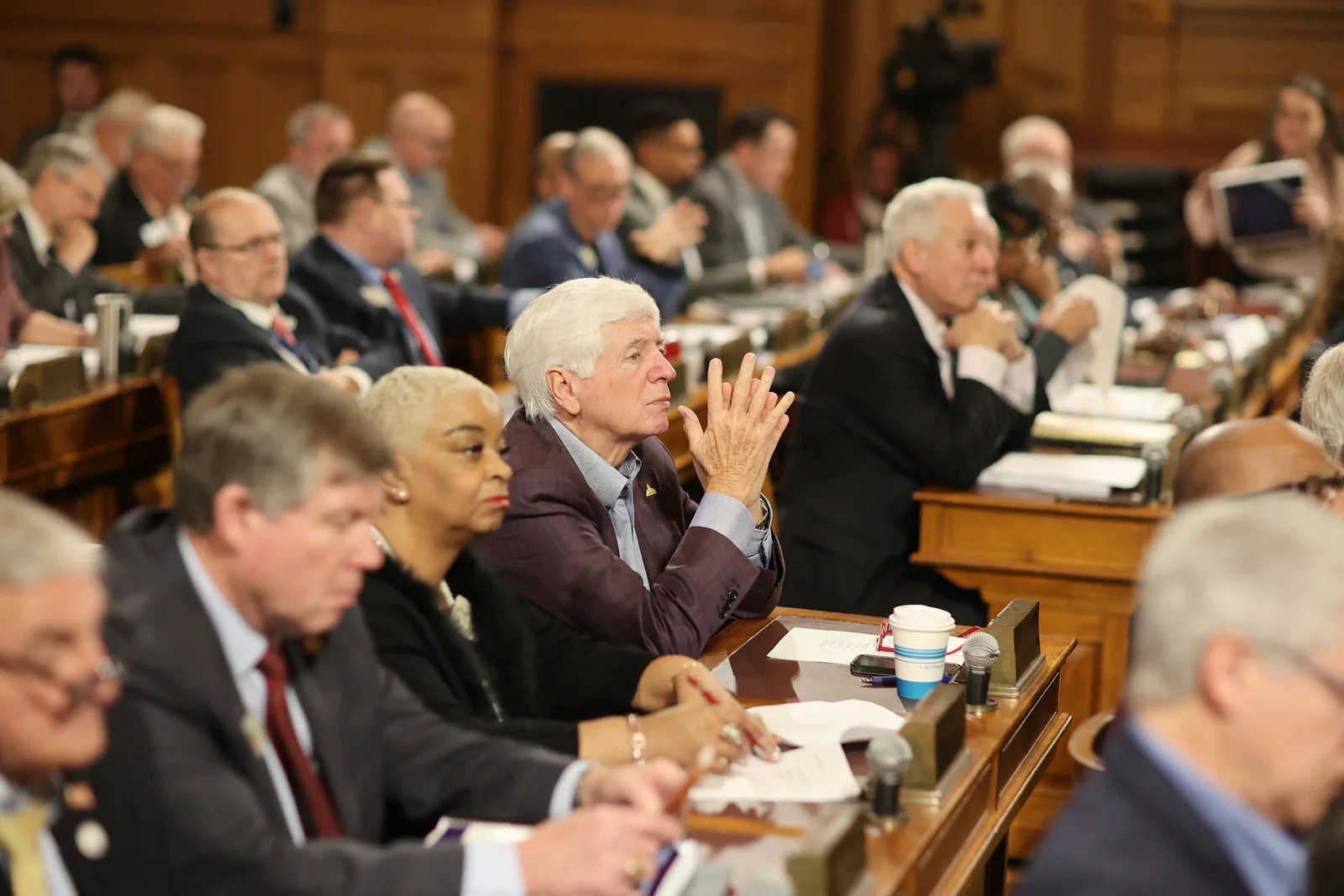Stay ahead of the curve as a political insider with deep policy analysis, daily briefings and policy-shaping tools.
Request a DemoGov. Kemp calls on state agencies to be fiscally restrained amid record $16.5B surplus

Members of the House and Senate listen to the presenters at the Joint Appropriations Committee Hearing. (Credit: Georgia House of Representatives)
- Gov. Kemp asks state agencies for fiscal restraint for amended fiscal years 2025 and 2026
- Education and health care continue to be budgetary drivers
- Georgia’s surplus and lottery reserves hit record highs
The Gist
Gov. Brian Kemp asked the state’s 51 government agencies for continued fiscal restraint when drafting their amended fiscal year 2025 and 2026 budgets.
Most agencies adhered to his request even as the state’s general fund surplus hit a record $16.5 billion last month.
Forty-five agencies, excluding state courts, followed the governor’s instructions to keep budgets flat, meaning no extraordinary requests or spending, according to Danny Kanso, senior fiscal analyst at Georgia Budget & Policy Institute. Thirty-one agencies maintained the same budget for the amended fiscal year 2025 and 24 agencies did so in their fiscal year 2026 budgets, Kanso said.
What’s Happening
Georgia is in the midst of its yearly multistep process of preparing the governor’s overall budget, which is a compilation of state needs and the governor’s thoughts. Now that state agencies have submitted their budgets with the governor’s instructions in mind, the real work begins.
“It’s a very restrained, conservative budget request, in line with the governor’s priority of having a fiscally responsible state,” Tony West, state director of the conservative grassroots advocacy organization Americans for Prosperity, told State Affairs.
“Overall, that’s a good thing because when you keep budgets flat, you incentivize agencies to be more efficient with taxpayer dollars,” West added. “That then allows for the governor and the Legislature to focus more on areas of specific need that may require additional funding. Overall, it allows them more flexibility to lower tax rates, to keep Georgia competitive with its neighbors.”
The state agencies’ proposed budgets cover operational expenses, payroll and capital projects, with the state having a debt management plan.
The Governor’s Office of Planning and Budget reviews the agencies’ budgets and works with the governor to craft recommendations for the General Assembly in January. The governor also works with the state economist to determine revenue estimates for the upcoming budget cycle.
In addition to receiving state money, many agencies get federal funding.
Kanso noted several highlights in the budgetary requests:
- All told, state agencies have asked for $35.9 billion in the fiscal year 2026 budget. By comparison, the agencies asked for $36.5 billion in the amended fiscal year 2025 budget. The change reflects an increase of $340 million from the fiscal year 2025 budget the governor signed into law earlier this year.
- The Department of Education’s fiscal year 2026 budget will decrease by $466 million — or 4% — to $12.8 billion. The decrease is due to declining enrollment and the state’s funding formula for education, which requires local districts to contribute more as property values increase. For example, due to increases in local property tax valuation, school districts will receive $726 million less from the state. The Department of Education has made “several requests specifically related to school safety,” K-12 department spokeswoman Meghan Fricke told State Affairs. The Sept. 4 shooting at Apalachee High School in Winder prompted officials across the state to redouble their safety efforts. State Superintendent Richards Woods said he wants to add a school resource officer and crisis alert system in every school and expand Georgia’s APEX mental health program in schools to “enact policies that support more timely and effective sharing of reports, records and alerts among law enforcement, school districts and across agencies.”
- The Board of Regents, which oversees state colleges and universities, is requesting a 7% year-over-year increase for fiscal year 2026.
- Medicaid is projected to see a 7% increase in spending for fiscal year 2026, bringing the total budget to $5.3 billion. Georgia is currently spending $4.9 billion.
- The Department of Transportation is seeking an 11% increase for the amended 2025 budget and a 13% increase for the fiscal year 2026 budget.
Why It Matters
The state budget is the only piece of legislation the General Assembly is legally mandated to pass each year.
Education — which includes pre-K through 12th grade and higher education — and health care are the two largest expenditures in Georgia’s budget, accounting for about 73% of the fiscal year 2025 budget spending.
The conservative approach has been part of the state’s budgetary process for a while.
Adjusting for inflation, Georgia spends about $3,223 for every resident, up from $3,080 during fiscal year 2006, according to the Georgia Budget & Policy Institute.
“That’s a very, very conservative spending trajectory,” Kanso said. “Spending has actually changed very little in the state” in the past two decades, he added.
Meanwhile, the state last month released its end-of-year report on reserves and revenue, which shows Georgia has an all-time-high balance of cash on hand. The state’s general fund surplus stands at a record $16.5 billion. About $5.5 billion of that is in the state’s revenue shortfall reserve, which essentially is the state’s savings account. The remaining surplus is undesignated, meaning those funds can be spent at the discretion of the governor and General Assembly.
Additionally, the state’s most recent lottery reserves, which fund higher education and pre-K, have reached a record $2.4 billion, up from $2.2 billion last year.
Kemp’s conservative fiscal approach has routinely drawn criticism, but West said it’s the right approach.
“I understand why some people may have that opinion,” West said. “But what the past two governors — [Nathan] Deal and Kemp — have done by allowing that rainy-day fund to remain strong is to allow for our high-quality bond rating and then the ability to finance projects at a low interest rate. It’s setting Georgia up for prosperity for the long term.”
What’s Next?
The governor will release his budget recommendations in January, including updated revenue estimates. Gov. Kemp’s revenue estimate is important in setting the budget level.
Legislative review of the budgets will then begin around mid-January with state agencies making their case for their budgets.
WHERE MOST OF GEORGIA’S GENERAL FUND GOES
The following is where Georgia will spend most of its $36.1 billion General Fund in fiscal year 2025. These seven areas account for 96 cents of every state-appropriated dollar spent:
- Pre-K through 12th grade education: 38 cents
- Health care: 20 cents
- Higher education: 14 cents
- Infrastructure and transportation: 9 cents
- Corrections, legal system and reentry: 9 cents
- Debt service: 3 cents
- Department of Human Services: 3 cents
Source: Georgia Budget & Policy Institute
STEPS ALONG GEORGIA’S BUDGET PATH
Here is a step-by-step look at what it takes to create Georgia’s budget each year.
- Budget request instructions sent to agencies. In early summer, the Governor’s Office of Planning and Budget (OPB) sends guidelines to agencies so they can prepare their requests.
- Agencies prepare budget requests. Each agency prepares its request and gets board approval if applicable.
- Budget documents sent to the General Assembly. Agencies submit all current and upcoming fiscal year documents to OPB by Sept. 11.
- Budget requests submitted. The governor, OPB staff and agency leaders review and assess current and new budget requests.
- Governor finishes budget. By the end of the calendar year, the governor finalizes the budget proposals.
- Budget requests analyzed. In January, the governor presents the budget proposals within the first five days of the General Assembly session.
- Legislative appropriations process happens. The appropriations committees in the Georgia House of Representatives and Senate hold budget hearings for the current and upcoming fiscal years.
- House approves its budget. The House votes on changes to the governor’s budget proposals.
- Senate approves its budget. The Senate reviews the House-passed budget for the current and upcoming fiscal years, makes changes and votes on the latest versions.
- Conference Committee meets. The House and Senate each vote to approve the final version.
- Final version approved. The lieutenant governor and speaker of the House appoint a conference committee of members of both chambers to negotiate a single version of the budget.
- Appropriations bill sent to governor. The governor has 40 days from the end of the Legislative session to sign the budget into law and may veto specific sections.
Source: Georgia Budget & Policy Institute
See Gov. Kemp’s instructions for state agencies to submit budgets here.
Have questions? Contact Tammy Joyner on X @lvjoyner or at [email protected].
Know the most important news affecting Georgia
Get our free weekly newsletter that covers government, policy and politics that impact your everyday life—in 5 minutes or less.
Georgia defies bomb threats as election chief declares a “free, fair and fast” vote amid record turnout
ATLANTA – Despite dealing with over 60 bomb threats, Georgia’s election chief said Tuesday the state’s general election went smoothly. Georgia had a record turnout with nearly 5.3 million people voting, Secretary of State Brad Raffensperger told reporters. Election officials in the state’s 159 counties have until 5 p.m. to certify votes. “We had a …
In the (state)house: Meet the newest members of the Georgia legislature
When lawmakers reconvene at the state Capitol on Jan. 13, there’ll be a cadre of new faces in the 236-member Georgia General Assembly, one of the nation’s largest state legislatures. All 236 statehouse seats were up for election this year. Most candidates ran unopposed. Incumbents in contested races easily kept their seats, with the exception …
2 young Democrats win Statehouse seats as Republicans hold majority
ATLANTA — Many Statehouse incumbents appeared to beat back challengers Tuesday, ensuring their return to the Capitol in January. Republicans retain control of the House and Senate. Two Generation Z candidates will join the 236-member Legislature as new members of the House of Representatives: Democrats Bryce Berry and Gabriel Sanchez. Berry, a 22-year-old Atlanta middle …
Election night 2024: What to watch for as the results roll in
It’s been a long time coming, but we’ve finally made it to Election Day 2024. Today’s most anticipated race is, of course, the presidential contest between Vice President Kamala Harris and former President Donald Trump. The pair have spent a combined $25 million in new media ads alone in the past two weeks in this …




